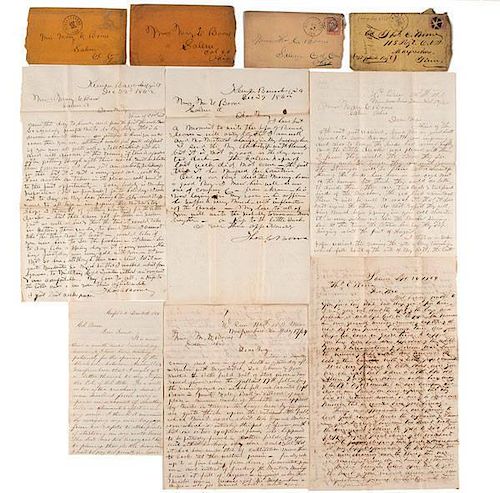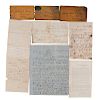Lt. Col. Thomas C. Boone, 115th Ohio Infantry, Civil War Manuscript & Photographic Archive
About Seller
6270 Este Ave.
Cincinnati , OH 45232
United States
With offices in Cincinnati, Cleveland and Denver, Cowan’s holds over 40 auctions each year, with annual sales exceeding $16M. We reach buyers around the globe, and take pride in our reputation for integrity, customer service and great results. A full-service house, Cowan’s Auctions specializes in Am...Read more
Two ways to bid:
- Leave a max absentee bid and the platform will bid on your behalf up to your maximum bid during the live auction.
- Bid live during the auction and your bids will be submitted real-time to the auctioneer.
Bid Increments
| Price | Bid Increment |
|---|---|
| $0 | $25 |
| $500 | $50 |
| $1,000 | $100 |
| $2,000 | $250 |
| $5,000 | $500 |
| $10,000 | $1,000 |
| $20,000 | $2,500 |
| $50,000 | $5,000 |
| $100,000 | $10,000 |
About Auction
Jun 13, 2014 - Jun 14, 2014
Cowan's Auctions dawnie@cowans.com
- Lot Description
59 war-date letters (including 23 soldier's letters); 6 pre- and post-war letters; journal, 1874; 6 post-war account books; plus 130+ photographs, mostly unidentified subjects, including 16 photographs of Boone. Ca 1850-1874.
The 115th Ohio performed much of the dirty work necessary in the western theatre during the Civil War. Raised primarily in Columbiana County and mustering into the federal service at Camp Massillon in August 1862, the regiment was temporarily split early up in its service, with roughly half, under the command of then-Lt. Col. Thomas Boone, assigned to guard duty at Camp Chase Prison and the other half to duty at Cincinnati. Overseeing both political and military prisoners at a time of profound instability in the state, Boone was at the epicenter of a vicious legal battle, caught between the state's Copperhead civil authorities who had issued a writ of habeas corpus for the outspoken Peace Democrat Clement Vallandingham and his own commanding general Ambrose Burnside, who had ordered that all habeas corpus orders from state be ignored. As a military man, Boone followed his commander's orders, even after a judge ordered his arrest: only the body guard he had gathered around him prevented the arrest from being carried out.
From the late summer 1863 through the end of the war, Boone and his regiment were assigned to suppress guerrilla activity in Kentucky and Tennessee and to ward off the periodic raids from Confederate forces. In July 1863, he pursued John Morgan during the raid into Ohio, and he saw a series of sharp engagements at Lavergne, TN, on Aug. 31, 1864, and during Hood's campaign near Nashville in Dec. 1864. On Dec. 4 that year, he commanded a detachment of the 115th, supplemented with "Colored" troops from the 14th and 44th USCT, which was assigned to defend a series of stockades and block houses. He fought fiercely until forced to retreat in good order to Nashville: I knew that should the place be surrendered or taken by assault a butchery would follow... Boone was cited for taking command of the 3rd Michigan at Murfreesboro on Dec 7, 1864, and inflicting heavy losses on Confederate Gen. Abe Buford. He remained in Tennessee until the end of the war, discharged at Cleveland on July 7, 1865. Thereafter, the 115th fared less well: three companies of the regiment were captured during Hood's advance on Nashville and when they were finally freed at war's end, were transported north aboard the ill-fated steamer Sultana. Eighty-three of Boone's men lost their lives that day.
Although Boone's letters contain almost no significant battle content (apart from a few mentions of Nathan Bedford Forrest and other guerrilla activity) and nothing relating to either his experience as a political hot potato in Ohio or the Sultana, they are nevertheless sterling examples of Civil War correspondence. These lovely, warm letters to his wife Mary (apparently a convinced Quaker) and daughter Sarah at home in Salem, OH, are filled with unusual details revealing the intimacy uniting a family separated by war: sending home two pairs of mocking birds (do not expect they will sing much before spring, in your cold climate), visiting wounded men in the hospital, and politics are all mixed with discussions of his military experiences in Tennessee.
Among the highlights of the collection are several important letters in which Boone discusses race and slavery in occupied Tennessee. From Murfreesboro, Jan 31, 1864, he wrote: I expect to take Pete with me to Gallatin & the whole rounds – says he likes the yankeys better that [sic] the Rebs. His father called to see me, wants me to take Pete's sister and send home – have not seen her. She is about 15 years old & the old man says she is a christian. Tell Alma there is a large opening here to teach the 'degraded race,' but how she could get at it or who to apply to cannot at present inform her. There are some northern ladies in Murfreesboro teaching the colored girls & boys, but suppose she have to apply through some Christian missionary Society, and do not know whether they admit Quakeresses....
Even better are two letters describing the impact the war had on slave-holders in Tennessee. Boone was not a war-time convert to antislavery, he had been an opponent of slavery before the war. Among the small number of pre-war letters in the collection is an 1859 letter written by Boone from Macon City, MO, Oct. 5, 1859, in which he observed optimistically: Slavery is nearly extinct here you do not see but very few, occasionally you see them at Hottells. We have 4 at this House I am now stopping at. There is one little fellow here about ten years old that would attract Farcey's attention, he is naturally the cutest darkey I ever saw. He reminds me of the darkies described in Uncle Tom's Cabbin who could not keep still one moment. This fellow has a fashion of blinking, especially when he is waiting on the table & has generally a very commick appearance....
War shaded his opinions of slavery. Beginning with a detailed description of a visit to the Stones River battlefield, thick with graves for ten square miles, Boone's letter of Jan. 17, 1864, followed with an account of visiting a local farm: instead of finding the master & mistress found it full of negroes – inquired where their master was – answer, got no massa – have a missa – who got married about a month ago, lives about a mile off – is mighty sick. Rebs took all her horses mules cows &c., and she is a Reb. I asked a negro man and woman why they did not leave her, replied the latter here is four children cant leave them & cant take them with me – the farmer made similar answer... His glee was hardly restrained a month later when he stumbled onto a novel scene near Gallatin: I saw last week something that done me a great deal of good. A man who has been a Reb long enough to loose all his slaves, chopping wood. He went at it very awkward indeed, the whole comy. were watching him for some time from our window – it is also strange to see Genl. Paine hireing negroes to there once masters, and telling them they are no more slaves but free black men, but they must work harder now then they did when slaves – something of that kind occurring every day...
Boone's ardor for the war was unflagging. In October 1864, he wrote: As anxious as I am to be home with my little family and friends permanently, do not expect to or intend comming untill these Rebbs are compelled to lay down their arms and return to their parent government as all unruly and wicked children should for correction and punishment, and that time is not now far distant. The copperheads need not cry peace any longer on their terms, it is comming fast on better terms, and I hope on a basis that will if possible make us a stronger and more prosperous government than before this Rebbelion broke out... Mary's letters back to Thomas are perhaps even better, displaying an admirable stoicism. On Dec. 11, 1864, she wrote: I have not received one line from thee, have not had a letter from thee, written since the fight at Franklin. So thee may well know I am anxious to hear from thee. In looking over the list of killed & wounded in our daily paper, have seen the name of one only from the 115th. I judge from that, the 115th was not in the fight, or at least was not badly used up. Still I am very anxious to hear & learn the particulars...
Other letters in the collection include one from a brother, James, Sep. 24, 1864, describing turmoil on the homefront over the fate of their young men at war: women here were generally uneasy, rumors of capture of the whole Regt were prevelant through town, and your dispatch came in good time. I suppose you have now had some experience of the realities pomp & circumstance of glorious war & heared the music of rebel bullets and answered the echo of their canon with a little grape & canister. It is very pleasant to talk about now you are all right but I am a little like old Allen Farquhar when he asked how many of the 19th Regt (3 months) on our company had died or were killed. On being informed that they had all returned sound, he said if he could have known that he would have gone himself.
Among the 130+ images accompanying the letters are 16 photographs of Boone, including 4 loose CDVs of Boone in uniform and 8 cartes inserted in loose album pages. The 4 post-war cabinet cards include an image of an older Boone posed in uniform with a sword; an unmounted albumen of Boone in uniform with horse; an unmounted image of Boone in civilian attire; and an image depicting the elderly Boone with a vignette inset above his head showing his younger self in uniform. The additional 15 cased images and approx. 109 CDVs (housed in 3 albums) are presumably photos of family and friends. Miscellaneous items include some post-war personal accounts, four non-war-date letters; and an 1850 membership certificate in a fraternal order.
A robust collection of letters from a senior Civil War officer from Ohio.Most letters with envelopes; soiling and wear and expected age toning; photographs in rough condition except as noted. All photos are in rough condition, soiled and faded, with several separating from their mounts. 1850 membership certificate in a fraternal order is in poor condition, with separation at folds, but with seal intact.Condition
- Shipping Info
-
SHIPPING. At the request of the buyer, Cowan's will authorize the shipment of purchased items. Shipments usually occur within two weeks after payment has been received. Shipment is generally made via UPS Ground service. Unless buyer gives special instructions, the shipping method shall be at the sole discretion of Cowan's Auctions, Inc.. Cowan's is in no way responsible for the acts or omissions of independent handlers, packers or shippers of purchased items or for any loss, damage or delay from the packing or shipping of any property.
-
- Buyer's Premium



 EUR
EUR CAD
CAD AUD
AUD GBP
GBP MXN
MXN HKD
HKD CNY
CNY MYR
MYR SEK
SEK SGD
SGD CHF
CHF THB
THB






